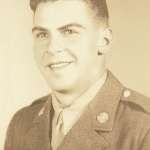
Deep in the hardwoods of upstate New York, there is a leaf-covered path that winds through clusters of cherry, maple, elm trees and one mighty oak. Standing among these clusters, the solitary oak tree stands as large as life itself, and the base of this tree is thick and round and its root deep and well grounded. The finger-like tree limbs seemingly reach to the heavens, arms bending, but never fallen. During summer storms, the dense treetop wavers, but never breaks. The gusting winds through the leaves whisper, but never shout. During peaceful afternoons, the mighty oak stands firm, branches shaping the sunlight that plays along the ground, showing a beautiful kaleidoscope of colors and shapes for all of nature to enjoy and a shelter for others to rest. This mighty tree is a historic reference to time gone by. From a sapling that survived great hardship and struggle, to a young tree hoping its root would be deep enough, its base strong enough and its direction true enough to stand the trials of life.
Under this tree there is also a rich history. The solid ground beneath this majestic oak holds the remains of a man that was much like the tree itself, strong, gentle, protecting and comforting. My father’s ashes lay beneath this great oak and his essence would only serve to strengthen the very wood itself. My father is my hero and on this Memorial Day, I choose to write about the incredible cost of freedom.
Robert E. McFee was a young farmer in Mexico, New York. Post-depression times were difficult, but farmers all helped each other. This interwoven social structure is the very fabric that our early Country was knitted from. Robert was interested in music, sports, and girls, like any young man. He felt a deep sense of loyalty to his mother and father and to his Country. Sheltered from complicated World events and with limited knowledge, Robert was angered to hear that Germany was at war with the United States of America and its Allies. He left the farm and enlisted in the Army to help in any way he could to provide the assurance of continued freedom in his homeland. He was ill prepared for what he would experience.
July 1812, Fort McHenry, Baltimore Maryland:
Fort McHenry stands strong at the entrance of Baltimore Harbor, a vigil to protect Baltimore from a British invasion that was sure to come. The War of 1812 was in full swing. Major George Armistead, commander of Fort McHenry, who wishing to identify his position from a distance, requested a flag be made. A young woman named Mary Young Pickersgill who had experience making flags for ships was tasked with making a large flag to identify Fort McHenry from the sea. Mrs. Pickersgill and her thirteen-year-old daughter Caroline crafted a flag that measured 30 feet by 42 feet, out of 400 yards of their best fabric. They shaped fifteen stars that measured 2 feet from point to point, and eight red stripes and seven white strips, each two feet wide. The flag was delivered to Major Armistead in August of 1813. The flag was stored away for one year due to the fact that Britain did not attack Fort McHenry until August 19th, 1814, when the British invaded Chesapeake Bay and attacked and torched the capitol building and the White House. The flames were visible forty miles away in Baltimore and Major Armistead prepared for war and to protect the 40,000 Americans living in the City of Baltimore. Armistead’s order; make sure the British can see who we are from their ships.
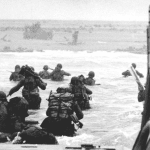
Normandy Beach, June 6th 1944. The largest amphibian invasion in history stood poised on the horizon. 6,900 vessels dotted the sea and were all focused on the French Beaches. This bold attack would herald the end of the Nazi occupation of Europe and the downfall of Hitler’s murderous rule. Between the missions of the brave soldiers and the victory they sought to provide, lay numerous bloody battles and approximately 406,000 Americans would lose their lives. The American fighting force averaged 18-24 years old and came from small and large towns across America. They were sons, husbands, fathers…farmers. These young men grew together despite their immense differences. They learned to accept the fear that they felt, the risk they faced and fully embraced the duty of which they willingly served. This brave fighting force made up what now is called, “The Greatest Generation,” and all accepted one simple fact, that giving one’s life for the lives and freedoms of others is the noblest life one could possibly attain.
The Normandy beach lay in front of them. The lives they loved behind, and the courage to move forward instilled by a belief that was greater than their own fear–the love of their bothers in arms.
My father left for Europe as a young farmer, committed to fighting for his Country and even dying for his Country if needed. He left behind his youth, his family and his innocence and walked away from innate fear and into his personal sacrifice.
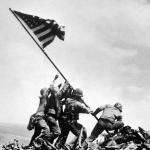
Francis Scott Key was a young Lawyer, author and part-time poet from Maryland. He was asked to assist in negotiating a prisoner exchange with Colonel John Stuart Skinner, aboard the British ship HMS Tonnant. The American prisoner was an elderly Dr. William Beanes, who had been captured by British forces. Upon arriving at the British ship, Key, Stuart and Beanes were detained because they were then aware of the British strength and intent to attack Fort McHenry. It was from the decks of the HMS Tonnant that Francis Scott Key witnesses the historic battle that raged throughout the night and into the morning of the next day.
During the many battles of World War II, one of the first acts to signal that ground has been won, was to plant the American flag, to raise it high. Our brave soldiers didn’t sit and ponder the future, they didn’t agonize over the recent past…instead they celebrated the signaling to all who could see that the American flag, the American freedom and the American ideal could be found on that small speck of land, claimed by sacrifice and covered with the graves and blood of all who helped claim it. The Flag at Iwo Jima on top of Mount Suribachi signaled to all, men fought here, men died here and men had done this to willingly claim this land in the name of freedom for all mankind. The flag raised high would allow others near and far to look upon the flag as a symbol of hope for the future and with great reverence to the past and the true cost of freedom.
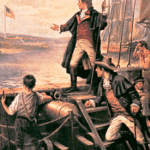
Francis Scott Key watched in horror as Fort McHenry was attacked. Key realized that as long as the battle was being waged, his Country had a fighting chance. The British soon decided that the battle was too costly and retreated from Fort McHenry. In the still darkened dawn of the following day Francis Scott Key found the encouragement he needed and was inspired by this view of Fort McHenry, to craft a poem that has served to unify our very Country and is as symbolic as our flag. The sentiment of our Country, past, present and future, took form that morning in the words of a part-time poet and a full-time Patriot.
In reading Scott’s words as the poem and form they were written in, it is possible to be transported to the deck of that British ship as Key saw only glimpses of his beloved fort, in the receding light of the British rockets and the majestic moment that he recognized the faint image of that symbolic flag, battered, but still flying, an image that encapsulates our freedom and the sacrifices to assure our freedoms. Key’s fears were allayed, his hope still remained as strong and his words still as powerful today as they were on that September night in 1814.
O! Say can you see, by the dawn’s early light,
what so proudly we hailed at the twilight’s last gleaming,
Whose broad stripes and bright stars through the perilous fight,
O’er the ramparts we watched were so gallantly streaming?
And the rockets red glare, the bombs bursting in air
gave proof through the night, that our flag was still there.
O! Say does that Star-Spangled banner yet wave
O’er the land of the free and the home of the brave?
On the shore, dimly seen through the mists of the deep,
Where the foes haughty host in dread silence reposes,
What is that which the breeze O’er the towering steep,
as it fitfully blows, half conceals, half discloses?
Now it catches the gleam of the morning’s first beam,
In full glory reflected, now shines in the stream.
Tis the Star-Spangled banner,O! Long may it wave,
O’er the land of the free and the home of the brave.
And where is that band, who so vauntingly swore,
that the havoc of war and the battle’s confusion,
a home and a Country should leave us no more!
Their blood has washed out their foul footsteps pollution.
No refuge could save, the hireling and the slave,
from the terror of flight, or the gloom of the grave.
And the Star-Spangled banner in triumph does wave,
O’er the land of the free and the home of the brave.
O! Thus be it ever when freemen shall stand,
between their loved home and the war’s desolation
Blessed with victory and peace, may the heav’n rescued land,
praise the power that hath made and preserved us a Nation.
Then conquer we must, when our cause it is just,
and this be our motto: “In God is our trust.”
And the Star-Spangled banner in triumph shall wave,
O’er the land of the free and the home of the brave!
The timely and inspired words of a young Lawyer and poet represented the hopes and fears of our young Country. We collectively and individually seek justice, hope and liberty. We seek Freedom. The concept of freedom is expansive and perhaps not a cost we can quantify. Those who are willing to make the ultimate sacrifice for the freedom enjoyed by the living have paid the high cost of freedom throughout history.
From the war for independence, to the current wars fought against terrorism, there are men and women who will gladly fight for a principle, even if they personally disagree with the political reasoning of men who live in safety. These brave soldiers fight for each other, for themselves and for the collective fabric of the Nation they love.
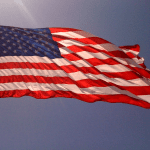 Under that oak tree in Upstate New York lays a Patriot. Like this tree, my father stood in a dense forest of men, all brave, all strong, all committed to the same mission. Like this tree, my father’s history continues to be evident in our lives. Like this strong and sturdy tree, my father stands proud of his place in the forest of our lives, in the forest of our Country, a forest that stands proudly against the borders of oppression and hatred, protectively encircling the massive fields of freedom and security, the land and the people who love freedom and are willing to harvest any and all resources to continue the growth of our principles.
Under that oak tree in Upstate New York lays a Patriot. Like this tree, my father stood in a dense forest of men, all brave, all strong, all committed to the same mission. Like this tree, my father’s history continues to be evident in our lives. Like this strong and sturdy tree, my father stands proud of his place in the forest of our lives, in the forest of our Country, a forest that stands proudly against the borders of oppression and hatred, protectively encircling the massive fields of freedom and security, the land and the people who love freedom and are willing to harvest any and all resources to continue the growth of our principles.
It is that very willingness of our Country to pay the price of freedom with our own children, husbands, wives, sons and daughters, that allows us to define the price of freedom…the cost is great, but freedom is priceless. It cannot be purchased or quantified. The price is, like most sacrifices…a gift. The gift for others to open, wrapped in the bloody war clothes of patriots.
I think of my father often, but on Memorial Day especially, I picture him standing tall in the hardwood forest. A solitary-oak. I see him looking out on the land from that hilly view and I picture him content that he can still overlook the land purchased in sacrifice and offered in love. A land planted in peace, but fenced in war.
Thank you Dad and all those Patriots who we Honor and remember on this and every Memorial Day.


